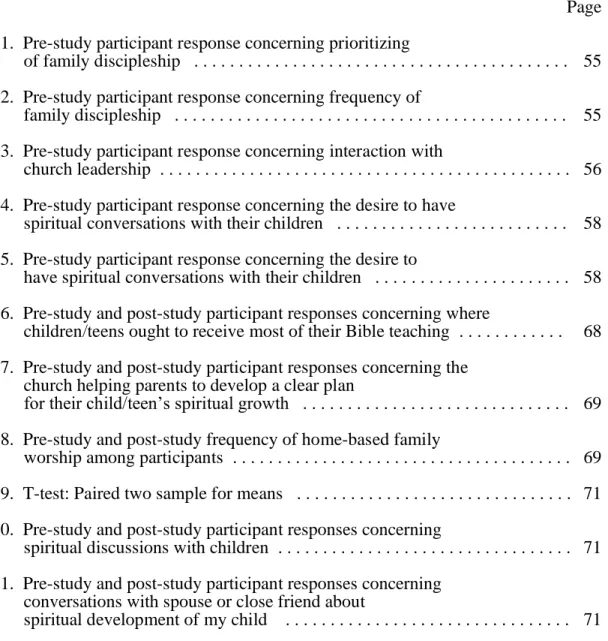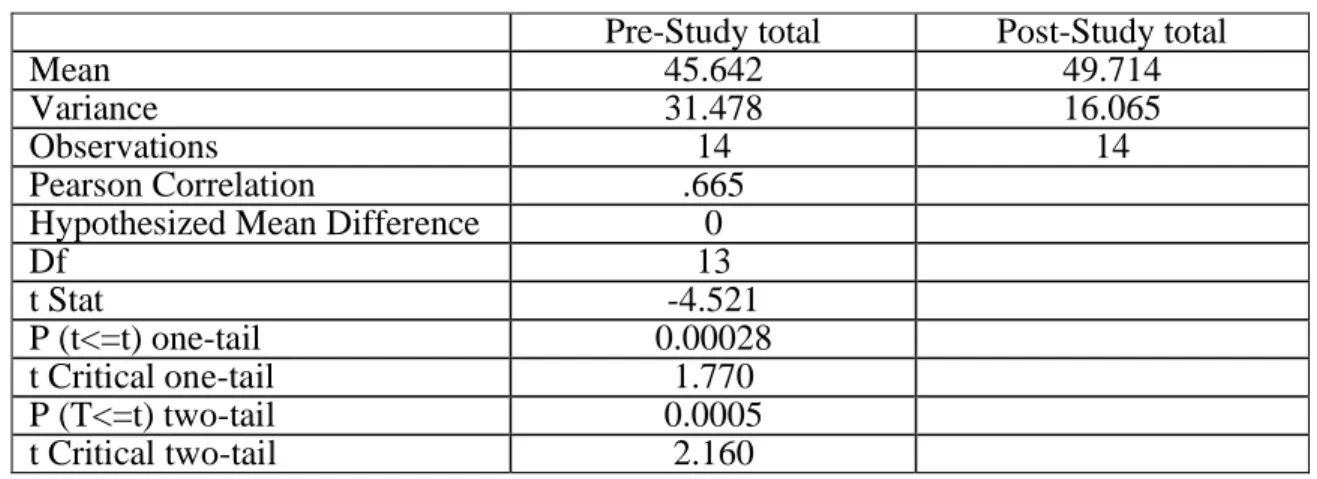The purpose of this project was to equip parents at Mountain View Community Church, Frederick, Maryland, to disciple their children at home. The Family Discipleship Practices Inventory (FDPI) collected responses from session participants.4 The FDPI served as a pretest to establish a baseline score for participants and was previously sent to participants. An expert panel measured this goal by using a rubric to evaluate the biblical faithfulness, teaching methodology, scope and appropriateness of the curriculum.5 The expert panel consisted of an MVCC elder/leader with a vision for family discipleship, a family.
Parents are primarily responsible for the spiritual formation of their children. 8.

The Foundation of Family Discipleship of Family Discipleship
Daniel Block notes that Deuteronomy 6:4-5, also known as the Shema, is one of the most important symbols of Judaism. In this passage, Moses spoke of a threefold internal dimension of the believer's love for God. Craigie, The Book of Deuteronomy, The New International Commentary of the Old Testament, 2nd ed.
Block notes that Deuteronomy 6:7 implies the combination of indoctrinating children along with spontaneous discussion of God's commands.
The Faith Passed on to Future Generations on to Future Generations
Fathers should demonstrate personal trust in the Lord with the understanding that their faithfulness can create the right environment in which their children can also personally trust in God and live a faithful life. This psalm speaks of fathers neglecting their responsibility to teach their children and warns fathers of the consequences of such neglect. Fathers must cooperate with their wives and the local church in teaching and training their children.
Finally, fathers must not only teach their children, but must encourage their children to be obedient to this teaching and to the commands of God.
How Each Member of the Family Participates in Family Discipleship Family Participates in Family Discipleship
The religious life of the children and the family should be the primary concern of parents. Intentional equipping of parents as the primary disciple makers of their children was the intent of the puritans and early evangelical leaders in America. The third goal of the project was to develop a curriculum to train both parents and children's ministry staff on the biblical foundations and practical methods of parents serving as disciple makers of their children.
The class also evaluated the role of the church and the need to cooperate with the church in the discipleship of children. This class consisted of parents to review many of the resources available for family discipleship. The survey was also given to the children's ministry directors, who also have a long life with the church and have a good understanding of the families with younger children.
Week 1 of the class was titled "What is Family Discipleship?" The class began with my personal testimony; I shared how I started taking responsibility for the. In the first session, I provided parents with a blog post by Tim Challies called "Why Satan Is No Friend of the Family."3 I also tried during class to use videos to highlight family discipleship and further educate parents rest for the discipleship of their children. In the New Testament, Paul commands fathers in Ephesians 6:4 to raise their children in the discipline and instruction of the Lord.
Due to the frequency of the questions asked in the survey and the impossibility to measure, as well as the lack of participation from the children's ministry staff, this aim was partially successful. It also speaks specifically to the effectiveness of the classroom curriculum, which was a key tool in helping develop that plan. At the beginning of each class, I asked participants to share one thing they did the previous week for family discipleship.
As participants shared each week at the beginning of class about how they were in person.

Would Do Differently
What Does the Bible Say about Family Discipleship?
God wants people to be good, kind and honest with each other, as the Bible and most world religions teach. In the heart (v8) "he will bind them as a sign on your hand, and they will be like front pages between your eyes" - Beliefs, feelings, decisions. Tell your children/grandchildren about the Lord and His work in history (scripture/current culture).
We'll talk more about this in the coming weeks and provide practical help, but for those of you who are impatient, here are 6 ways to teach your children the Bible.
What Is My Role?
The research is almost unanimous on this point: parents matter most in shaping the religious life of their children. Don't choose a church based on a large children's ministry; choose a church that will disciple you first. As we look at the Church's role in the discipleship of your children, let's watch this comical video that sparks this dynamic and relationship.
In many ways this is the traditional view of Primary.8 This role does not emphasize that parents have the primary role of discipleship with their children. Because the Church does not see the role of parents as the primary disciple makers of their children, the Church devotes its time to the discipleship of children and teens, and regularly fails to equip and invest in parents. The final model of family ministry was articulated by Timothy Paul Jones in Family Ministry Field Guide, when he defined family empowerment ministry as “the process of deliberately and persistently coordinating a ministry's proclamation and practices so that parents are recognized, trained, and held responsible held as first disciple-makers in their children's lives.”10 Family-sized ministry is consistent with family-integrated and family-based models of ministry in their desire for parents to be their children's primary disciple-makers.
8 Bryan Nelson and Timothy Paul Jones, foreword to Trained in the Fear of God: Family Ministry in Theological, Historical, and Practical Perspective, ed. 9 Brandon Shields, "Family-Based Ministry: Separated Contexts, Shared Focus," in Perspectives on Family Ministry: Three Views, ed. This model does not have ministries focused on children's or youth ministry, including the kindergarten.
The entire congregation participates in worship.11 Allowing children to witness and participate in worship has many benefits, including the child's ability to absorb and internalize worship, prayer, and doctrinal teaching.12 This model relies heavily on the equipping of fathers as leaders, as well as family worship to maintain consistent discipleship across generations. Do you see yourself as your children's primary disciple or do you see that as the role of the church.
Practical Development of your Family’s Discipleship Develop Your Vision
- Own Family Discipleship for your Family
- Write your Vision and Specific Goals for your Family’s Discipleship
- Examine Your Family Rhythm for Ideal Discipleship Moments
This will guide our plan: (next week) What would you like to teach your children. Committed and equipped to evangelize and disciple others in order to fulfill the Great Commission upon exiting the family/youth group. Equipped to serve God in the local church, they use their talents to serve the body.
I am confident that if you search every hour of your day and discover ways to use your time, you will find time for family discipleship. The Value of Time in Family Discipleship: Creating scheduled time built into the rhythm of family life for reflection, conversation, and gospel living. Family worship is the regular use of the Bible, prayer and singing in the family to praise God.
Moses encouraged fathers to diligently teach their children when they are at home, when they are on the road, when they get up and when they go to sleep. Set aside time and brainstorm ideas for your family and the ages of your children that will give you the best religious interactions. It is easiest to start at the beginning of the school year or at the beginning of the new year.
Start with one time slot in applying Deuteronomy 6 and strive for consistency before adding additional times to disciple your children. Review the section "What would you like to teach your children?" and start making your list of important teaching topics for them that reflect your vision/goals.
Practical Development of Your Family’s Discipleship Make Your Plans
- Implement Your Vision/Goals and Make a Plan for Family Discipleship
One of the best ways to serve both your children and the Church is to deliberately speak well of your love and passion for the Church and leadership. There are many possibilities: as a family, with peers in youth or as an individual. The biggest question is not what is available, the question is whether you can limit so as not to neglect to teach your children the above aspects.
Pastor Adam will list what funds he has spent in the last 10 years on his own.
Practical Development of Your Family’s Discipleship Fulfill the Mission
- Keep your Vision in Focus, which may require you to Adjust your Plans based on the Age of your Children
- Share your Family Discipleship Journey with other Families from Church
- Utilize Family Discipleship to Launch Your Children to Fulfill the Great Commission
- Help and Equip other Parents to begin Family Discipleship
- Implement Your Vision/Goals and Make a Plan for Family Discipleship. (next week)
- Keep your Vision in Focus, which may require you to Adjust your Plans based on
- Share your Family Discipleship Journey with other Families from Church. (in two weeks)
- Utilize Family Discipleship to Launch Your Children to Fulfill the Great Commission. (in two weeks)
- Help and Equip other Parents to begin Family Discipleship. (in two weeks)
Family discipleship not only affects the children in the home, but it should affect people outside our home with the gospel of Jesus Christ. However, I hope that families that have learned, adapted and grown as a result of the family. discipleship can begin to equip and help other families find their footing in the family discipleship journey. Family discipleship is an intentional process in which believing parents guide their unbelieving or less mature believing children to embrace and apply the gospel in all areas of their lives.
Family discipleship is a process that involves children's personal declaration of faith in Jesus Christ as He is revealed in the scriptures. As we close, I would like to spend the remaining time encouraging you as a couple to discuss family discipleship of your children. We will do this slowly and as we look at the next few sessions, we will go through several steps as we develop a practical plan for family discipleship.
Read what others have written about family discipleship and talk to other parents you admire who have also striven to disciple their children. Share your family's journey to discipleship with other Latter-day Saint families. in two weeks) two weeks). Evaluate your progress at the end of a semester to learn from the past and make future family discipleship plans.
Start discussing your plan and fill out the Family Discipleship Plan for your family. John Wesley's Formative Reading of Scripture as an Appropriate Model for Family Discipleship." DEdMin thesis, The Southern Baptist Theological Seminary, 2018.







